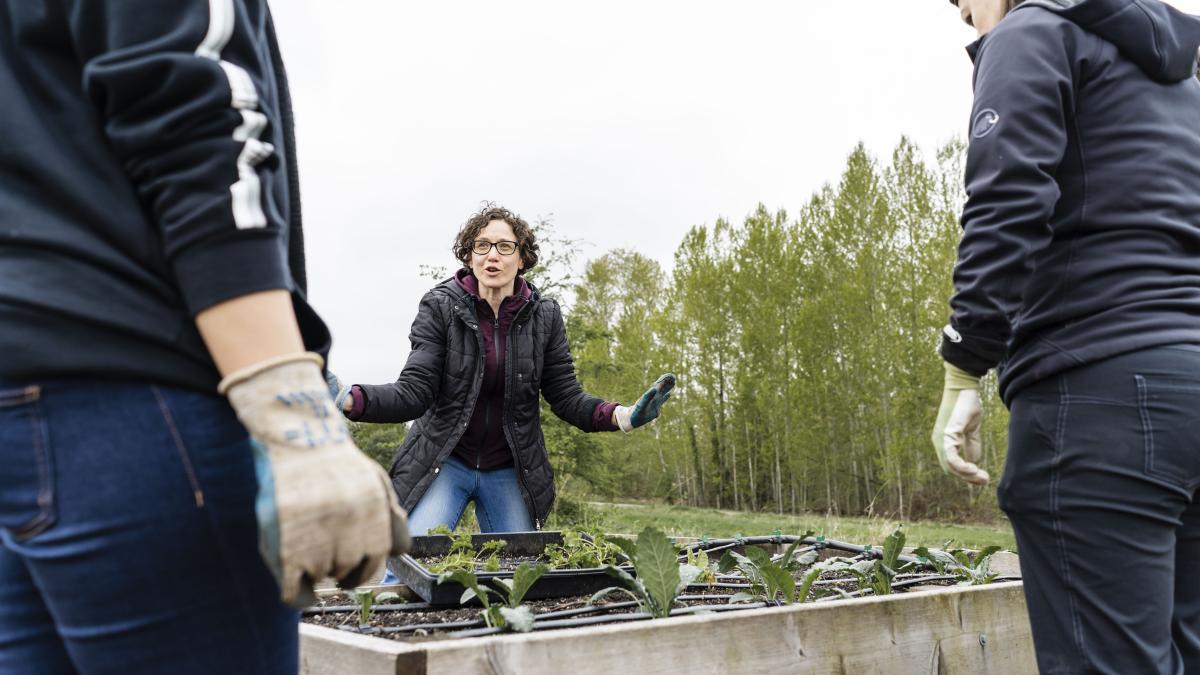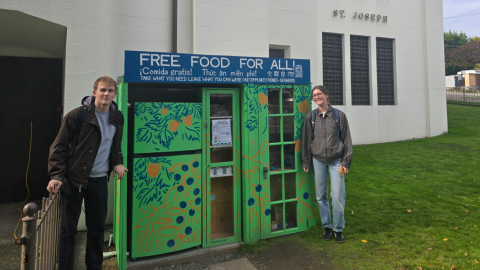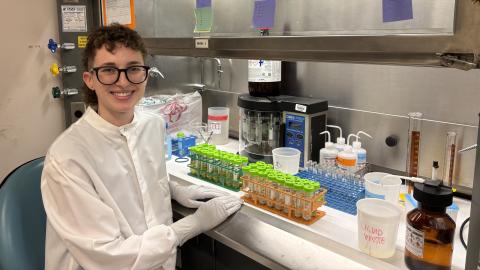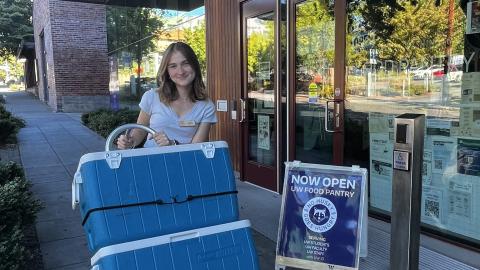Before she was a food systems and sustainability expert, Yona Sipos was a video jockey for MTV Canada.
Between interviews with celebrities like Avril Lavigne and music videos for Outkast's Hey Ya!, Sipos talked to her teenage audience about science—everything from how to plant an urban garden to cool science experiments to do at home.
As a master’s student in agroforestry with a background in plant biology, Sipos was driven to find compelling ways and non-traditional spaces to educate people about the social impact of science and the environment.
It’s with this same spirit that she now teaches undergraduates at the University of Washington School of Public Health.
“I wanted to, and still do, cultivate curiosity about cool and important scientific themes that impact our daily lives, and that we can impact as well,” said Sipos, lecturer in the Department of Environmental & Occupational Health Sciences (DEOHS) and core faculty in the Nutritional Sciences Program.
Out of the classroom, into the field
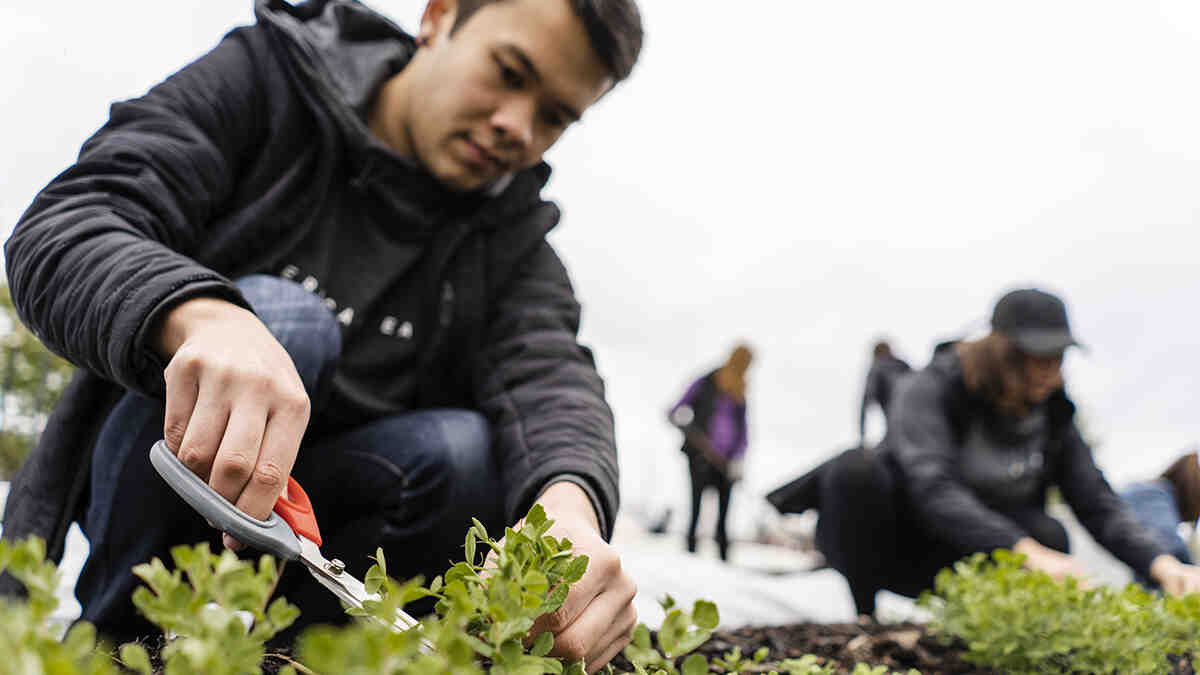
Sipos is helping to launch the new Food Systems, Nutrition and Health major and teaches the required Food Systems: Harvest to Health class. Students examine food from the time it is seeded and harvested from farms and fields to when it arrives on plates, in bellies and beyond.
They learn about the food system through hands-on activities at the UW Farm, a 1.5-acre urban farm and educational facility, and at UW Recycling, which manages the University’s recycling, composting and waste reduction efforts.
Working outdoors is not new to Sipos, who grew up in gardens and on poultry and tree-fruit farms in Hamilton, Ontario, a town halfway between Toronto and Niagara Falls. Her grandparents were farmers who emigrated as refugees from Hungary in 1956.
Sipos received her master’s and her PhD in Integrated Studies in Land and Food Systems from the University of British Columbia.
Exploring the power of connections
.jpg)
Through these real-life experiences, students can find meaning in the factors and processes that shape and constrain the food system, according to Sipos. Insights they gain represent fundamental concepts of an approach called systems thinking.
Systems thinking examines linkages and interactions between the pieces that comprise the whole of the system. It is particularly useful in understanding and addressing complex problems, such as those seen in public health and global health.
“Many of the problems we deal with are complex, and to grapple with them, academia has had a tradition of working on component parts, which results in working in silos and within disciplines,” Sipos said. “Systems thinking gets students to become problem-solvers, to work across disciplines and to realize the power of human and ecological connections.”
Of course, researchers at the UW School of Public Health and elsewhere tackle complex problems on a daily basis, Sipos explained.
But the ability of future food systems and public health leaders to perform effective systems thinking is important to the world’s future.
Seeing the whole picture
-hero_0.png)
“There’s a fallacy that we can simply outsource our food system,” Sipos said.
“We go grocery shopping, and the shelves are stocked. We order meal kits and go to restaurants. We create food waste, and somebody else deals with it. But a lot of the time, having other people manage these problems has not been productive.”
Sipos uses chickens, apples, corn, beef and strawberries as case studies. Focusing on a different food each week, her students examine the many facets of modern food supply—from production and processing to distribution, marketing and retail, as well as food waste and recovery.
The course also explores social, cultural, political, economic, equity and ecological drivers, including the politics of farming, the price of land and the availability of young farmers.
Students investigate barriers to productivity and sustainability and propose solutions. Sipos is currently developing the capstone project, a culminating experience that will pair teams of students with community partners across the local and regional food system.
Food systems through an equity lens
Prior to joining the UW, Sipos was program director for the Chesapeake Foodshed Network, a regional initiative to develop learning opportunities and work groups across the food system.
A key aspect of this work was to promote community ownership and equity. She has also contributed to food system sustainability reports in Canada and the United States and served on the Vancouver Food Policy Council and the Prince George’s County Food Equity Council.
Sipos uses these experiences to help frame food systems issues and to encourage students to ask questions in new and different ways that prioritize equity.
“Approaching food system issues from an equity lens is about elevating those voices that are often left out of the story but who are central to how the story plays out,” Sipos said.
For example, in Harvest to Health, Sipos discusses how America’s industrial agricultural system is in large part built on slavery, and she emphasizes the role of farmworkers in the food supply chain.
Beyond canvas bags and reusable straws
Anyone can help make the food system more sustainable, according to Sipos. We can use canvas bags when we go grocery shopping. We can shop at farmers’ markets. We can bring our own mug to Starbucks and carry a reusable straw.
For her part, Sipos and her family are on a quest to reduce their plastic consumption by making their own yogurt and cottage cheese and fermenting and pickling foods.
“All of this is important, and I encourage it entirely, but the food system is what it is because of much bigger systems than those that operate at the individual level,” she said.
“Part of public health is anticipating what the next crisis could be, and we are already seeing crises playing out across the food system. This is why embedding the Food Systems major within public health is very powerful.”
